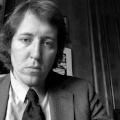Down the left column,
disappointments; down
the right column,
disenchantments. A
tendentious mix. His father
had argued with a neighbor
over fences and property
lines, and the neighbor
returned, forced open
the door, and shot him in
the foyer while the young boy
watched, this was Fairbanks,
1959, and the father picked
himself up, bullet in his
intestinal tract, and drove
himself to surgery, leaving
my father alone in the lately
invaded home. Think of
the word lurch, which is what
a bus does. Think of the way
eyes shine in darkness. The
most I’ll hope for is sadness;
the least, silence. Of any two
coincidences, desire for
narrative makes coherence.
But it’s only one perspective
and this planet is teeming.
Paradise
Andy Stallings
Feature Date
- January 5, 2019
Series
Selected By
Share This Poem
Print This Poem
Copyright © 2019 by Andy Stallings.
All rights reserved.
Reproduced by Poetry Daily with permission.
As a bird learns to sing first by listening, Andy Stallings’s Paradise is attuned and attentive to surrounding song. Stallings’s second collection’s interests are as various as the paradises that scaffold a life: paradises lost in memory’s mutable echo or fleetingly glimpsed in “the depth of a living tree,” in children squabbling or sketching colorful “scribulations,” in “such gloss, and sway, and / transparent grace as paradise / deftly affords.” Of course, “The value of tolerance for / paradise varies depending on / the tolerance, the paradise,” and Stallings awes at some versions while working to dismantle others. The praise that emerges in this careful awareness is tender, grave, and full of delight. In Paradise, the inherent dignity of each thing— animal, vegetable, familial, ethereal—pulses into profound focus: “Nothing in / the universe is delicate / at scale.” “The stem of a flower should / not suffice to hold up / the weight of the blossom. / And yet.”
“Paradise is a work of radical reception. With unflinching attention and deep compassion, Stallings charts experiences of place, family, memory, identity, and, always, relation, weaving these moments into a shifting, breathing text: ‘Your / shadow constant on / the boxcars moving past, / say reflection and river, say / body and strangers’ eyes.’ If we simultaneously make and are made by the world, Stallings maps this morphing territory with exquisite nuance, moving steadfastly toward complexity and a generative bewilderment, ‘a map that leaves us astray in unmarked woods.’ Stallings’s Paradise traces the intricacies of both thought and perception, what we desire and what we receive, what we create and what we stumble upon; Paradise, interrogated; ‘a soft, deniable animal.’”
—Laura Walker
“Echoing Voltaire’s dictum ‘Paradise is where I am,’ Andy Stallings’s collection of variegated ‘paradises’ finds paradise where he is, in the sensory details and stories of daily life, in ‘a pastry / brought home wrapped / in plastic, the smell of mid- /summer rain.’ Like days, the paradises keep coming, reassuringly regular. But there’s also trouble in paradise, as Stallings well knows, and the poems ask how much our access to paradise, even and especially the everyday kind, is dependent not on our behavior but on factors beyond our control—our skin color, gender, sexual orientation. Stallings’s always taut, often paratactic and aphoristic lyrics, exquisitely aware of sound, are compellingly intelligent, endlessly conscientious. My personal version of paradise would be full of thinking this attentive to others and to the world around us.”
—Donna Stonecipher
“When I first encountered this work it was winter, and as I read I became aware that it was snowing inside my body. I was not only transported—I had changed. These poems keep arriving, in every season, which is to say they are love. Over and over we move into the familiar and become new; we molt and stand back to look at the shape. ‘I know what the sky sees,’ Stallings says, and soon, so will you.”
—Emily Kendal Frey
Poetry Daily Depends on You
With your support, we make reading the best contemporary poetry a treasured daily experience. Consider a contribution today.





